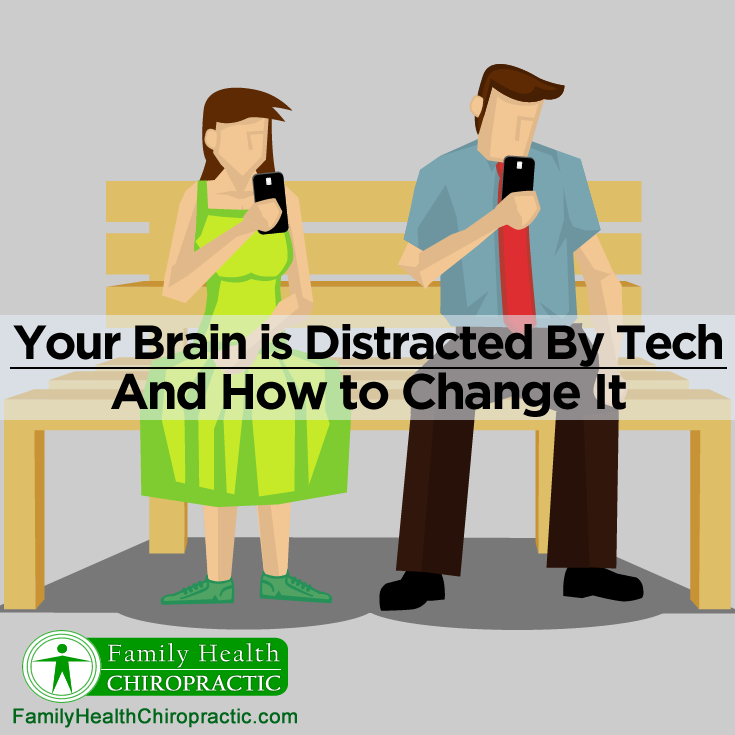We are at a point in our lives where distraction is literally rewiring our brains. New studies are finding that the constant inputs from our external environment is having a significant impact on our health. Keep reading if you’re still with me and learn how you can protect yourself!
Your attention is constantly blurred with information and it’s likely that you may have overlooked news of our incredibly shrinking attention span because of it. A survey of Canadian media consumption recently concluded that the average attention span had fallen to eight seconds, down from 12 in the year 2000. This means we now have a shorter attention span than goldfish!!!
We live in a world of almost infinite possibility for distraction.
A recent study in PLOS One found that the average young adult checks his or her smartphone every 11 minutes and spends more than five hours (30 percent of the day) interacting with it (1). What we should consider are the lost moments that led to reflection and personal quiet presence have now been filled with a constant need to check emails, scroll through facebook or entertain ourselves on twitter and snapchat.
Of course, I’m not saying there’s anything wrong with these activities- but when we consider the “lost moments” of personal time and reflection; what are the consequences? Any of you who are my patients know that I teach based on ancestral living patterns. When it comes to taking care of the body I always base my initial recommendation on that of our genetics, which was selected hundreds of thousands of years ago. My ultimate message is that our declining health and rate of disease is due to the mismatch between our genes, biology and our current diet and lifestyle.
It should go without saying that the increasing impact of technology and its ability to distract and fragment our attention is yet another aspect of this mismatch.
Technology is Making Us Sick
Studies have shown that increased use of a smartphone is associated with anxiety, depression, and sleep disturbance in adolescents and adults (2, 3). Other studies have shown a relationship between problematic internet use and electronic gaming and psychological distress and problem behavior in youths including risk of addiction patterns associated with negative effects on sleep, energy, eating habits, weight, exercise and academic performance (4, 5).
All disease and dysfunction can be summed up into a combination of toxicity and deficiency. If our technology is creating a toxic distracting brain pattern, then we should also be mindful of focusing our attention into the present moment and work on counteracting the negative consequences of our increasingly fragmented attention spans.
This of it as brushing and flossing- but for your brain.
Mindfulness Is Like Brushing Your Teeth, But for Your Brain
Mindfulness simply means being aware of your thoughts, feelings, bodily sensations, and surrounding environment on a moment-to-moment basis. It means paying attention to what is, rather than getting lost in our thoughts about the future or the past.
The American Psychological Association’s Stress in America survey found that Millennials, aged 18-33, were the country’s most-stressed generation. But now, the title belongs to an even younger demographic: American teenagers.
In fact, stress studies have repeatedly confirmed that stress levels are continuing to rise in younger and younger generations.
I believe mindfulness practice is a potential antidote to a modern life characterized by distraction, worry, anxiety, and other sources of perceived stress. It trains us to keep our awareness and attention in the present moment and experience our feelings and sensations without judgment.
Scientists are now quantifying the effects of mindfulness—even for a short time— demonstrating how it increases positive emotions while reducing negative emotions and stress (5). It also helps us tune out distractions and improve our ability to focus (6). It enhances our relationships, makes us feel more connected and relaxed, and boosts our compassion for ourselves and others (7).
What Happens to The Brain During Mindfulness Practice?
The ability for your brain to change and reorganize it’s connections is called Neuroplasticity, and it’s because of neuroplasticity that researchers can directly observe and quantify the effects of mindfulness meditation on the brain (8, 9, 10, 11).
The MAAS Test or Mindful Attention Awareness Scale is a 15-item scale designed to assess a core characteristic of dispositional mindfulness, namely, open or receptive awareness of and attention to what is taking place in the present. What is amazing is that people who have been assessed to be more mindful on a Mindful Attention Awareness Scale (MAAS), have reduced volume of gray matter within the right amygdala and left caudate of their brains compared to those assessed to be less mindful (12).
This research tells us 1) the brain is structurally different between people who are more mindful than those who are not and 2) specific areas in the brain are important for processing perceived stress (amydala and caudate structures).
To get additional clarification, a group of 35 unemployed men and women experiencing high levels of stress took part in a study where half were formally taught mindful meditation, and the rest were taught relaxation techniques that did not introduce mindfulness (each condensed to a three-day class).
The group that was taught mindfulness techniques showed a marked decrease in right amygdala resting state functional connectivity over time, indicating less stress-related communication within the brain.
What can mindfulness meditation do for you?
Research on the health benefits of mindfulness meditation is broad, from pain management, to reduction in anxiety and depression, to blood sugar control, to increased focus, to cellular aging, to healthy pregnancy, to improved sleep, and overall improved immunity.
There is literally 1,271 (at the time of writing this article) peer reviewed studied indexed in Pubmed on the health benefits of mindfulness practice (13).
How do you become more mindful?
- Practice mindfulness meditation
- Stop multitasking (it doesn’t work anyway!)
- Batch your email and social media
- Turn off notifications on your phone and computer
- Go off the grid (even if it’s only for a day)
- Do less (and accomplish more)
Check out these resources to help improve your mindfulness:
Did this information help you to understand more about Mindfulness?
Have you ever practiced mindfulness or meditation?
Share your opinion in the comments or email me!
If You Like What You Read, Click Here For Weekly Updates



